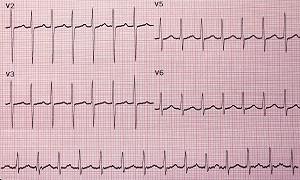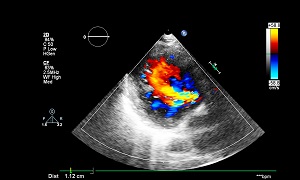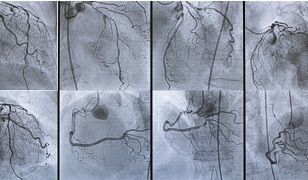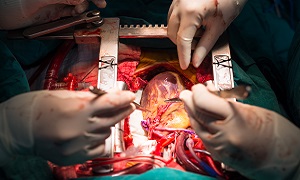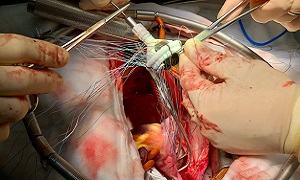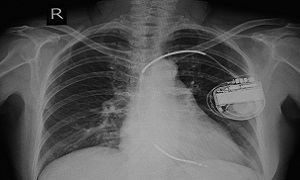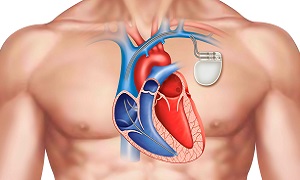Congestive Heart Failure
Congestive heart failure is a progressive condition affecting the pumping of blood. It occurs when the muscles of your heart fail to pump blood efficiently. This is mainly because of certain conditions like coronary artery disease (narrowing of arteries in your heart) and high blood pressure that weaken your heart. This results in inefficient filling of blood in your heart and pumping further.
Types of Heart Failure
- Left-sided Heart Failure – There is shortness of breath as the fluid backs up in the lungs.
- Right-sided Heart Failure – There is swelling because the fluid backs up into the legs, feet, and abdomen.
- Systolic Heart Failure – There is a pumping problem as the left ventricle cannot contract vigorously.
- Diastolic Heart Failure – Also known as heart failure with preserved ejection fraction, the left ventricle cannot fill fully or relax fully in this condition. This indicates a filling problem.
Causes of Congestive Heart Failure
When other conditions damage or weaken your heart, you may experience Heart Failure. This can also occur due to the stiffness of the heart. The ventricles (main pumping chambers of your heart) become stiff and don’t fill properly between the beats causing heart failure. In some cases of Heart Failure, there are weakened and damaged heart muscles. Due to this, the ventricles dilate (stretch) up to a point that the heart fails to pump blood efficiently throughout your body.
With the passage of time, the heart fails to fulfil the demands of pumping blood to the entire body. An ejection fraction helps to determine the pumping capacity of your heart while helping to identify Heart Failure for appropriate treatment. If the heart muscle becomes stiff due to high blood pressure, it may result in Heart Failure.
- High Blood Pressure or Hypertension- If you are suffering from hypertension, then your heart needs to work strenuously for circulating the blood throughout the body. This makes the heart muscles either stiff or weak for efficient pumping of blood.
- Cardiomyopathy- Also called the heart muscle damage, it has causes like infections, the toxic effect of drugs, diseases, alcohol abuse, and genetic factors.
- Coronary artery disease- It is a common form of heart disease and a common cause of heart failure. It occurs due to the buildup of plaque (fatty deposits) in your arteries. This reduces the flow of the blood causing heart attack.
- Congenital heart defects- These are the heart defects you are born with. If the chambers and valves of your heart don’t form correctly, the heart needs to work harder for pumping blood. This may cause Heart Failure.
- Faulty heart valves- The valves of the heart maintain the blood flow in a proper direction through your heart. Coronary artery disease, heart defects, or heart infection may damage the valve of your heart. This again forces your heart to work strenuously and weaken it with the passage of time.
- Heart arrhythmia– Also called the abnormal heart rhythm, it causes faster beating of your heart and creates extra work for it. However, Heart Failure may also take place due to slow heartbeats.
- Myocarditis- It is an inflammation of the muscles of the heart. Most of the viruses cause myocarditis which ultimately leads to left-sided Heart Failure.
- Other diseases- Chronic diseases like HIV, hypothyroidism, diabetes, hemochromatosis (buildup of iron), hyperthyroidism or amyloidosis (buildup of protein) may cause Heart Failure.
Symptoms of Congestive Heart Failure
- Edema (or swelling) in your legs, feet, and ankles
- Ascites or swelling of your abdomen
- Dyspnea or shortness of breath upon lying down or normally
- Reduced ability to exercise
- Nausea
- Weakness
- Persistent coughing or wheezing with blood-tinged phlegm
- Lack of appetite
- Fatigue
- Decreased alertness or difficulty in concentrating
- Irregular or rapid heartbeat
- Coughing up foamy, pink mucus
- Chest pain
- Increased urination during the night time
- Sudden and severe shortness of breath
Diagnosis of Congestive Heart Failure
Your doctor will note down a careful medical history, perform a physical examination, and review your symptoms to diagnose Heart Failure. Your doctor might check for risk factors like diabetes, blood pressure, and coronary artery disease. He or she might check for congestion in the lungs with the help of a stethoscope. This also helps in detecting abnormal heart sounds indicating Heart Failure. He or she will also check for fluid buildup in your legs and abdomen.
Blood tests
Electrocardiogram
Chest X-ray
Echocardiogram
Stress test
Stress test measures your heart’s health by evaluating the response of the heart to exertion. Your doctor might ask you to walk on a treadmill while an ECG machine is attached. Sometimes, the test is done wearing a mask that measures the ability of your lungs and heart to take in oxygen while breathing out carbon dioxide. Your doctor might use imaging techniques to visualize the heart while the test is on.
Magnetic Resonance Imaging
Computerized Tomography Scan
Myocardial Biopsy
Coronary Angiogram
Treatment options for Congestive Heart Failure
Medications
- Angiotensin-converting enzyme inhibitors: ACE inhibitors help people with systolic Heart Failure feel better. They are vasodilators and widen the blood vessels to reduce blood pressure. This improves the blood flow and decreases the workload on the heart.
- Angiotensin II receptor blockers: They have benefits similar to the ACE inhibitors and are an alternative for the people who can’t tolerate ACE inhibitors.
- Beta-blockers: These drugs slow down the heart rate and reduce blood pressure. This helps in limiting or reversing the damage to your heart if you have systolic Heart Failure. They reduce the risk of abnormal heart rhythms and improve heart function.
- Diuretics: These drugs make you urinate frequently and prevent the collection of fluids in your body. They also decrease fluid in the lungs for better breathing.
- Aldosterone antagonists: They help people with systolic Heart Failure to live longer.
- Inotropes: Your doctor will prescribe these drugs if you had severe Heart Failure to improve the pumping function of the heart and maintain the blood pressure.
Surgery and medical devices
Coronary bypass surgery
Heart valve repair
Implantable cardioverter-defibrillators
Cardiac Resynchronization Therapy
Palliative care



